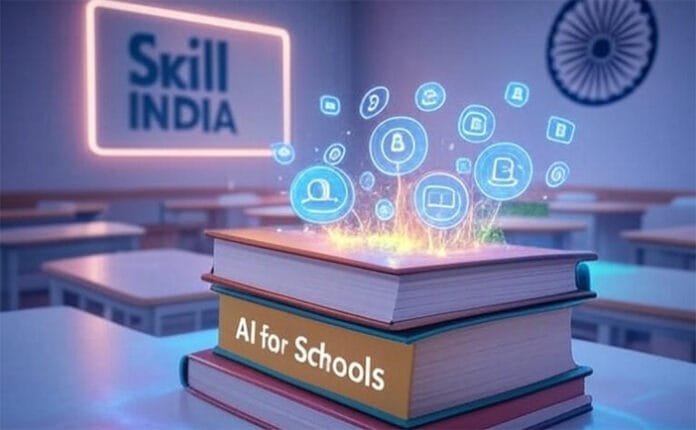Skill for AI Readiness: Transforming Education with AI Training from Class 6 to 12
In a groundbreaking move set to reshape the educational landscape of India, the Union Ministry of Skill Development and Entrepreneurship has launched the “Skill for AI Readiness” course, bringing artificial intelligence (AI) education to students from class 6 to 12. Backed by global technology leaders Microsoft, NASSCOM, and HCL, this initiative is not only inclusive of urban institutions but also reaches deeply into rural India, ensuring equitable access to future-ready skills.
Revolutionizing Education: Union Government’s Bold AI Push
At the launch event held in New Delhi, Union Minister of State for Skill Development, Jayant Chaudhary, unveiled a set of comprehensive AI learning modules as part of the BharatSkillNext 2025 under the Skill India Mission. The minister emphasized the government’s commitment to preparing young minds for leadership in a rapidly transforming digital world.
“Our aim is to empower the students of India with the tools of the future. AI is not just a subject; it’s the language of the next generation,” said Minister Chaudhary.
Scope and Structure of the Skill for AI Readiness Course
The Skill for AI Readiness program is designed to build AI awareness, digital literacy, and practical knowledge among school students. It introduces three levels of AI modules for students and one dedicated module for teachers. These modules will cover:
Basic AI concepts
Foundational digital skills
Machine learning fundamentals
Ethical considerations of AI
Hands-on AI applications
AI-driven problem solving
The learning path is designed to gradually evolve in complexity from Grade 6 to Grade 12, ensuring students gain an age-appropriate, yet robust, understanding of artificial intelligence and its real-world applications.
Microsoft, NASSCOM, and HCL: Powering India’s AI Learning Infrastructure
The collaboration with Microsoft, NASSCOM (National Association of Software and Service Companies), and HCL Technologies is a cornerstone of this initiative. These organizations bring world-class expertise, content, and digital tools to enrich the learning experience.
Microsoft’s Role
Microsoft has long championed AI learning through its AI Classroom Series and Future Ready Talent initiatives. In this project, Microsoft will:
Offer AI curriculum aligned with global standards
Provide access to Microsoft Azure AI tools
Enable immersive coding experiences with Visual Studio and GitHub Copilot
NASSCOM’s Contribution
As India’s apex IT industry body, NASSCOM brings industry insight and employability metrics to the curriculum:
Curating industry-aligned AI content
Certifying AI skill levels
Supporting teachers through train-the-trainer models
HCL’s Engagement
HCL’s focus lies in grassroots AI development. Their role includes:
Establishing AI Labs in rural schools
Funding infrastructure and connectivity support
Hosting AI innovation bootcamps
Empowering Rural and Underserved Communities
One of the most defining aspects of the Skill for AI Readiness initiative is its intent to bridge the urban-rural digital divide. With focused outreach and partnerships with state education boards, the program is being rolled out in both government and private schools across Tier 2 and Tier 3 cities, tribal belts, and aspirational districts.
Offline-compatible AI kits, vernacular-based learning materials, and teacher mentorship networks will ensure that the lack of internet connectivity does not limit a student’s potential.
Teacher Training: Equipping Educators to Lead the AI Revolution
The fourth module, created specifically for school teachers, is aimed at building AI literacy among educators. The goal is to create AI Ambassadors within every school who can:
Integrate AI into existing subjects
Guide project-based AI learning
Evaluate AI-driven student work
Encourage innovation and ethical AI use
Teachers will be given certification upon completion of the course and ongoing access to community forums, webinars, and digital toolkits.
AI Curriculum Highlights: What Students Will Learn
The curriculum is built around four pillars: Conceptual Understanding, Practical Skills, Project Work, and Ethical Awareness. Below is a snapshot of what each grade cluster will learn:
Grades 6-8 (Beginner)
Introduction to AI and Smart Technologies
Role of AI in Daily Life
Understanding Algorithms through Activities
Visual Coding and Gamified Learning
Grades 9-10 (Intermediate)
Core AI Concepts: NLP, Computer Vision, Robotics
Creating Simple AI Programs
AI in Social Impact Projects
Data Ethics and Privacy
Grades 11-12 (Advanced)
Building AI Models and Training Data Sets
AI for Real-World Problems: Healthcare, Climate, Security
Participating in National AI Hackathons
Exploring AI Careers and Industry Use Cases
A Nationwide Impact: Vision for 2025 and Beyond
With over 100,000 schools targeted by 2025, the initiative is expected to benefit more than 10 million students in its first phase. It aligns with India’s National Education Policy (NEP 2020) and Digital India mission, both of which stress on early tech exposure and 21st-century skills.
Moreover, the AI modules are integrated into the BharatSkill platform, making them easily accessible to schools and educational institutions across states.
Key Benefits of the Skill for AI Readiness Program
Future-Proof Learning: Equipping students for AI-driven careers
Inclusive Reach: Bridging rural-urban gaps
Hands-on Learning: Projects and real-world applications
Digital Fluency: Coding, tools, and platforms
Industry Collaboration: Exposure to global best practices
Teacher Empowerment: Enabling sustainable knowledge delivery
Conclusion: India’s Leap Toward a Smarter Tomorrow
The Skill for AI Readiness initiative is more than an educational reform—it is a strategic move to ensure India remains at the forefront of the global AI revolution. By introducing AI at the school level, the government is not just preparing students for the future but creating future leaders, innovators, and problem-solvers.
With strong collaborations, a well-structured curriculum, and a focus on accessibility and equity, this program has the potential to reshape the fabric of Indian education and turn millions of students into AI-ready citizens of tomorrow.














